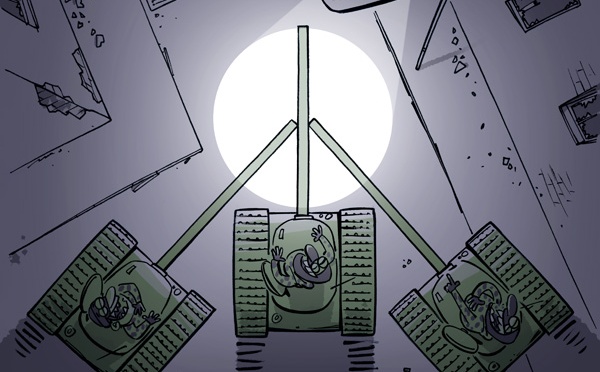Latvian cartoonist Gatis Šļūka’s “Joke About Peace,” 14 August 2014.
While many were posting, “Je suis Charlie,” David Brooks was pointing out the hypocrisy of that in “I am not Charlie Hebdo.” The same people championing freedom of expression in France, he noted, are likely less tolerant toward those who offend their views at home. “Americans may laud Charlie Hebdo for being brave enough to publish cartoons ridiculing the Prophet Muhammad, but, if Ayaan Hirsi Ali is invited to campus, there are often calls to deny her a podium.”
Brooks readily acknowledges that “provocateurs and other outlandish figures serve useful public roles” by saying, “Satirists and ridiculers expose our weakness and vanity when we are feeling proud. They puncture the self-puffery of the successful. They level social inequality by bringing the mighty low.” He even concludes his piece by saying, “The massacre at Charlie Hebdo should be an occasion to end speech codes. And it should remind us to be legally tolerant toward offensive voices, even as we are socially discriminating.”
But, somewhere in the middle, he lets slip how he really feels (and how so many others will feel once the current hoopla concludes):
In most societies, there’s the adults’ table and there’s the kids’ table. The people who read Le Monde or the establishment organs are at the adults’ table. The jesters, the holy fools and people like Ann Coulter and Bill Maher are at the kids’ table. They’re not granted complete respectability, but they are heard because in their unguided missile manner, they sometimes say necessary things that no one else is saying.
Well, dear David, while I defend your right to sneak in such stupid stuff, I also defend my right to disagree. And on all three counts.
First, your Americanocentric concept of common mealtime customs is flawed. Unlike what you see here, the other societies that I have encountered do not segregate by age. Children and adults—even old people!—sit at the same table. Which means that kids start learning about the way that the world works from an early age. And, IMHO, become more circumspect adults. For my part, I learned that firing squads and gulags were not peculiar to my family the same way that I learned that caviar was just fish eggs and eel was a delicacy: while seated at many tables with generations of Latvian displaced people.
Second, satirists are more than silly people. I discovered that at those tables, listening to the DP’s stories. Some concerned my father, who was assigned administrative duties in Valmiera during the German occupation. That did not stop him from writing. Each night before leaving his office, he composed doggerel mocking the interlopers and pinned it to his lampshade; each morning it was gone. His friends feared for his life but recited postings from memory when their superiors were out of earshot. My father was unconcerned, saying he could hardly be arrested for a few foolish words.
Third, only bad satire is hit-and-miss; good satire stings precisely because it is so spot-on. There was nothing accidental about the reaction people had to my father’s verse. Whether it changed anything then, I do not know. But I believe it could now given the multiplier effect of our media. If Tina Fey’s caricature of vice presidential candidate Sarah Palin did not determine the outcome of an election, it certainly swayed sentiment. And spawned a series of studies on “the Fey effect.” Which is what Napoleon might have had in mind when he said that James Gillray, a printmaker famous for social and political satire, did more than all the armies in Europe to bring him down.
So, dear reader, know that there are people like me out there who do not have a kids’ table at which to seat you should you partake of Charlie Hebdo. Or Chuck Palahniuk. Or The Onion. Or The Harvard Lampoon. Or Chris Rock. Or even The Interview, if you must. Moreover, they might even encourage you to cook up some satire of your own like my father did, not just be content to consume it. Even our Homeland Security Department exhorts: “If you see something, satirize something.” Or something to that effect. We all know that keeps us safe from an insidious enemy, intellectual and emotional sloth.
You can start with something easy. I recommend a threat from a far-off land or an unfamiliar culture. (I would be pleased if you took on Russia’s remarkable statement that my native Latvia can rest easy, but this is entirely up to you.) Once you master that, you can come a bit closer. Satirize something in your own land or culture. Then home in on your colleagues, friends and family. And, finally, on yourself.
Note: For more about my family and me during the Soviet re-occupation of Latvia and earlier times, see my short story “Making Soup.” My one-month-old narrator definitely deserves her place at the dining table.

